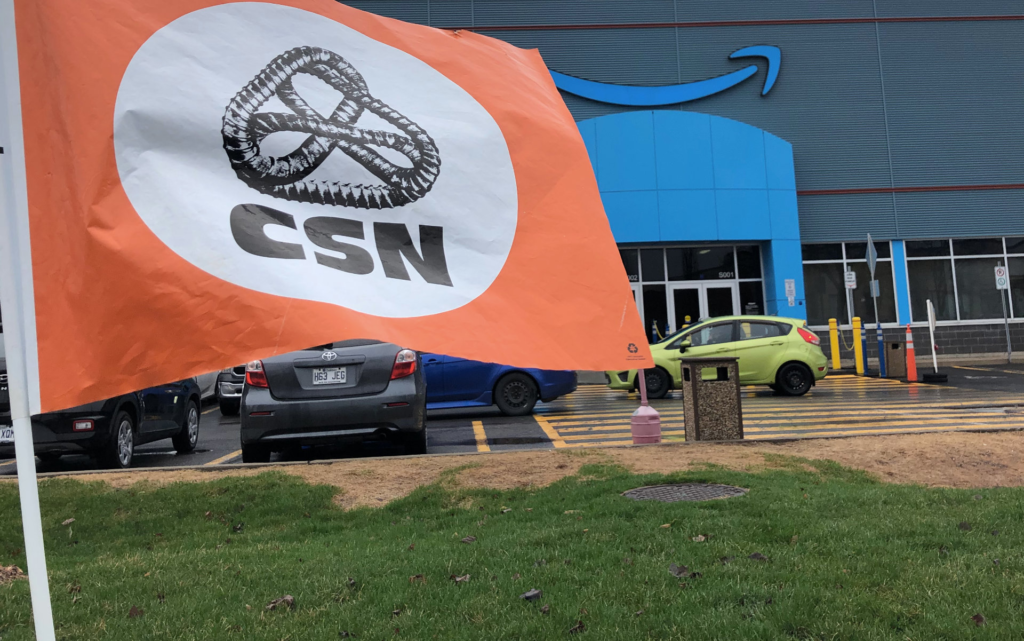On Friday, June 14, Amazon faced off against the CSN labour union before Quebec's Administrative Labour Tribunal (ALT). In a desperate bid to escape its obligation to negotiate with workers in the newly formed union at its DXT4 warehouse in Laval, Amazon is challenging the validity of the union's accreditation. North Star was present at the hearing.
Over the course of the morning, Amazon argued that the Quebec Labour Code violates the Canadian Charter of Rights and Freedoms by allowing unions to be recognized based on a majority of workers signing union cards, a mechanism known commonly as "card check" or "majority signup."
Amazon also questioned whether the ALT had properly scrutinized the evidence submitted by the CSN to prove that a majority of workers at the warehouse had signed union cards.
The e-commerce giant claimed it was advancing these arguments out of concern for employees who do not want a union. Those workers, Amazon claims, are having their right to freedom of association infringed.
A lawyer for the Procurer General of Quebec questioned whether Amazon has standing to bring a constitutional complaint on behalf of workers, noting that no workers had made such a complaint themselves. Also in question was whether Amazon, as an employer, is in a position to push for its workers' best interests.
Evidently, employers like Amazon have an interest in limiting their employees' ability to advocate for themselves. Amazon is also notorious for poor working conditions and union-busting.

In every jurisdiction where workers have successfully formed a union at an Amazon warehouse, Amazon has attempted to prevent or delay the process. In Staten Island, New York, Amazon workers at the JFK8 warehouse voted in favour of unionizing in March 2022. Amazon contested the vote, causing the union's accreditation to be delayed until January 2023.
Those workers are still without a collective agreement. Meanwhile, Amazon has embarked on a crusade against the United States' National Labor Relations Board.
In Coventry, England, Amazon attempted to block a union from forming at one of its warehouses by hiring 1,300 new workers. This diluted the hard-won majority signup achieved by the union and forced it to apply to the Central Arbitration Committee for the right to conduct a vote.
Amazon has not squashed unionization decisively in any of these three countries, but it is likely to keep trying. For now, Amazon workers in Coventry and Staten Island are benefiting from favourable decisions by judges and adjudicators who have interpreted labour laws in a way that protects their right to unionize. The same may hold true in Quebec if the TAT decides in favour of the CSN and the workers at DXT4.
However, the governments of Quebec, the United Kingdom, and the United States have demonstrated pro-business sympathies and a hostility to organized labour. Workers relying on courts and governments to protect their activities could find themselves in a precarious position if those institutions turn on them.
- “We’ve taken on a giant”
- Film review—”Union” lets the organizing process speak for itself
- Victory for Amazon workers at Quebec’s labour tribunal
- Laval Amazon Workers Turn Up the Heat
- Surprise show of force by Amazon workers in Laval
- Court dismisses “outlandish” Amazon constitutional challenge
- Laval Amazon workers protest for a fair salary
- Amazon Peak Season Kills
- Amazon delivery drivers walk off due to extreme cold
- Amazon buys time at Quebec’s labour tribunal
- Amazon Workers Keep Getting Poorer
- UK Workers take on Amazon
- Amazon hires 1300 workers to bust British union
- UK Amazon workers voting on union recognition
- Two steps forward, one step back for Unifor at Amazon fulfilment centres
- Amazon workers in Quebec ready to form historic union
- Amazon at war with the Labour Code following Quebec union certification
- Amazon pours millions into union-busting meetings
- Amazon’s no-holds-barred legal assault on unions comes to Quebec


